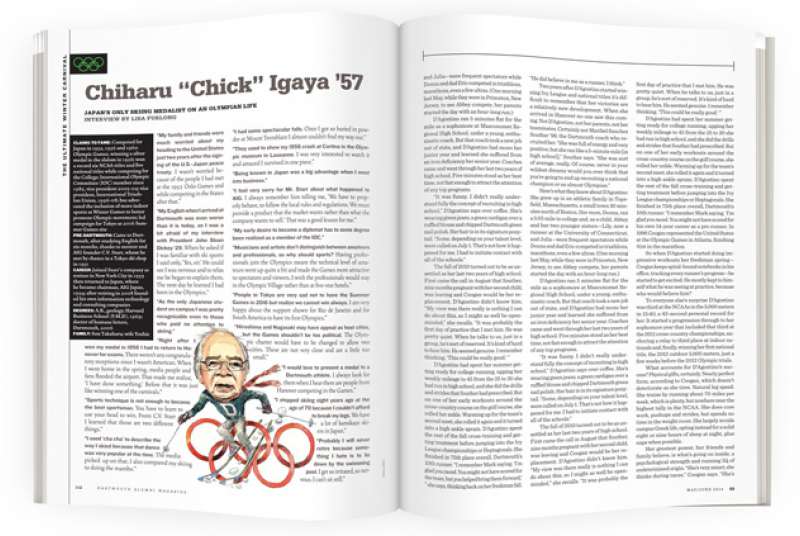
Chiharu “Chick” Igaya ’57
Claims to Fame: Competed for Japan in 1952, 1956 and 1960 Olympic Games, winning a silver medal in the slalom in 1956; won a record six NCAA titles and five national titles while competing for the College; International Olympic Committee (IOC) member since 1982, vice president 2005-09; vice president, International Triathlon Union, 1996-08; has advocated the inclusion of more indoor sports at Winter Games to better promote Olympic movement; led campaign for Tokyo as 2016 Summer Games site
Pre-Dartmouth: Came to Dartmouth, after studying English for six months, thanks to mentor and AIG founder C.V. Starr, whom he met by chance in a Tokyo ski shop in 1951
Career: Joined Starr’s company as trainee in New York City in 1959 then returned to Japan, where he became chairman, AIG Japan, 1994; after retiring in 2008 founded his own information technology and consulting companies
Degrees: A.B., geology; Harvard Business School (P.M.D), 1969; doctor of humane letters, Dartmouth, 2006
Family: Son Takaharu; wife Yoshie
“My family and friends were much worried about my heading to the United States just two years after the signing of the U.S.-Japan peace treaty. I wasn’t worried because of the people I had met at the 1952 Oslo Games and while competing in the States after that.”
“My English when I arrived at Dartmouth was even worse than it is today, so I was a bit afraid of my interview with President John Sloan Dickey ’29. When he asked if I was familiar with ski sports I said only, ‘Yes, sir.’ He could see I was nervous and to relax me he began to explain them. The next day he learned I had been in the Olympics.”
“As the only Japanese student on campus I was pretty recognizable even to those who paid no attention to skiing.”
“Right after I won my medal in 1956 I had to return to Hanover for exams. There weren’t any congratulatory receptions since I wasn’t American. When I went home in the spring, media people and fans flooded the airport. That made me realize, ‘I have done something.’ Before that it was just like winning one of the carnivals.”
“Sports technique is not enough to become the best sportsman. You have to learn to use your head to win. From C.V. Starr I learned that those are two different things.”
“I used ‘cha cha’ to describe the way I skied because that dance was very popular at the time. The media picked up on that. I also compared my skiing to doing the mambo.”
“I had some spectacular falls. Once I got so buried in powder at Mount Tremblant I almost couldn’t find my way out.”
“They used to show my 1956 crash at Cortina in the Olympic museum in Lausanne. I was very interested to watch it and amazed I survived in one piece.”
“Being known in Japan was a big advantage when I went into business.”
“I feel very sorry for Mr. Starr about what happened to AIG. I always remember him telling me, ‘We have to properly behave, to follow the local rules and regulations. We must provide a product that the market wants rather than what the company wants to sell.’ That was a good lesson for me.”
“My early desire to become a diplomat has to some degree been realized as a member of the IOC.”
“Musicians and artists don’t distinguish between amateurs and professionals, so why should sports? Having professionals join the Olympics meant the technical level of amateurs went up quite a bit and made the Games more attractive to spectators and viewers. I wish the professionals would stay in the Olympic Village rather than at five-star hotels.”
“People in Tokyo are very sad not to have the Summer Games in 2016 but realize we cannot win always. I am very happy about the support shown for Rio de Janeiro and for South America to have its first Olympics.”
“Hiroshima and Nagasaki may have appeal as host cities, but the Games shouldn’t be too political. The Olympic charter would have to be changed to allow two cities. These are not very close and are a little too small.”
“I would love to present a medal to a Dartmouth athlete. I always look for them when I hear there are people from Hanover competing in the Games.”
“I stopped skiing eight years ago at the age of 70 because I couldn’t afford to break my legs. We have a lot of kamikaze skiers in Japan.”
“Probably I will never retire because something I hate is to lie down by the swimming pool. I get so irritated, so nervous. I can’t sit still.”










